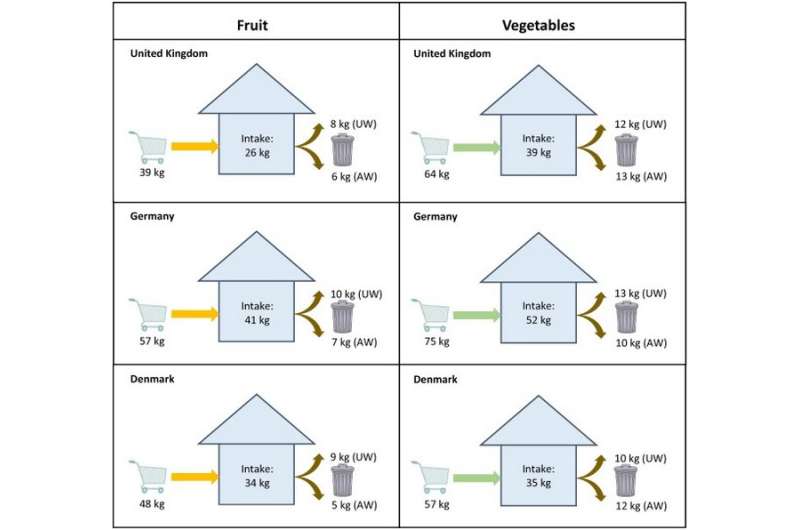EU households waste over 17 billion kg of fresh fruit and vegetables a year

A recently published JRC article finds that EU households generate about 35.3 kg of fresh fruit and vegetable waste per person per year, 14.2 kg of which is avoidable.
The UN's Food and Agriculture Organisation estimates that about one third of the food produced globally for human consumption is lost or wasted.
According to national studies, fresh fruit and vegetables contribute to almost 50% of the food waste generated by EU households.
This is to be expected given that they make up about one third of total food purchases, some of their mass is inedible (e.g. peel), and they are highly perishable and relatively cheap.
However, the JRC study found that the avoidable waste could be reduced by applying targeted prevention strategies, and that the unavoidable waste (in the form of inedible parts of the product such as peel, etc.) could be much more sustainably managed at the manufacturing stage and recycled for use in the circular economy.
The results of this study have implications for policies both on the prevention and the management of household food waste.
The proposed model can help establish baseline practices and the differences in waste generation between countries, investigate the effects of different consumption patterns on waste generation, and estimate the potential for reuse of unavoidable waste in other production systems, which is of great interest from a circular economy perspective.
It also has wider potential applications, for example in estimating the waste generated by other household commodities.
Avoidable and unavoidable waste
The authors created a model to estimate the amount of avoidable and unavoidable household waste made up of fresh fruit and vegetables that is generated by EU households.
Unavoidable waste (waste arising from food preparation or consumption that is not, and has never been, edible under normal circumstances) and avoidable waste (food thrown away that was, at some point prior to disposal, edible) was calculated for 51 types of fresh fruit and vegetables in six EU countries (Germany, Spain, Denmark, the Netherlands, Finland and the UK) for 2010.
These figures were used to estimate the unavoidable and avoidable waste generated by EU households from the consumption of fresh fruit and vegetables.
According to the study, 21.1 kg of unavoidable waste, and 14.2 kg of avoidable waste, is produced per capita in the EU every year.
On average, 29% (35.3 kg per person) of fresh fruit and vegetables purchased by households in the EU-28 is wasted, 12% (14.2 kg) of which was avoidable.
The authors found large differences in the avoidable and unavoidable waste generated by the different countries due to different levels of wasteful behaviours (linked to cultural and economic factors) and different consumption patterns (which influence the amount of unavoidable waste generated).
For example, although purchases of fresh vegetables are lower in the UK than in Germany, the amount of unavoidable waste generated per capita is almost the same, whereas the amount of avoidable waste is higher in the UK. Those countries whose citizens spend a higher percentage of their income on food were found to generate less avoidable waste.
More information: Valeria De Laurentiis et al, Quantifying household waste of fresh fruit and vegetables in the EU, Waste Management (2018). DOI: 10.1016/j.wasman.2018.04.001
Provided by European Commission Joint Research Centre

















